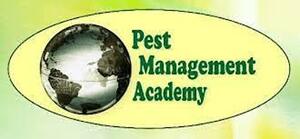More from NYC PestManagementSchool
More in Politics
Related Blogs
أرشيف
حصة الاجتماعي
How to Effectively Learn and Master Pest Control Skills
الجسم
Pests are a common problem in homes, farms, and workplaces. From termites eating away at wooden structures to rodents causing health concerns, pests can disrupt daily life and cause financial loss. To tackle these issues effectively, learning about pest control is essential. This article will guide you on understanding pest control, why training is important, and how you can get started in this field.
What Is Pest Control?
Pest control is the process of managing and eliminating unwanted creatures such as insects, rodents, and other animals that can harm people, plants, and property. This process involves using various tools, methods, and techniques to control infestations and prevent them from recurring.
The goal is not just to eliminate pests temporarily but to create a safe and healthy environment. Professionals in this field focus on both short-term solutions and long-term prevention strategies.
Why Is Pest Control Important?
Pests can cause numerous problems, including:
- Health Risks: Many pests, like cockroaches and rats, carry diseases that can harm humans and pets.
- Property Damage: Termites, for example, can destroy wooden structures, while rodents may chew on wires and cause electrical hazards.
- Economic Loss: For businesses, a pest infestation can lead to shutdowns, reputational damage, and financial losses.
Having trained professionals who understand how to handle these issues is critical for maintaining health, safety, and economic stability.
Who Needs Pest Control Training?
Pest control training is not only for professionals who want to work in the field but also for:
- Homeowners: To understand how to prevent infestations and handle minor issues effectively.
- Farmers and Gardeners: To protect crops and plants from pests without harming the environment.
- Facility Managers: To maintain pest-free environments in commercial or industrial spaces.
Learning these skills helps ensure safety and reduces the need for costly interventions later.
Benefits of Learning Pest Control
- Knowledge and Skills: Training equips you with the ability to identify different types of pests, their habits, and the best ways to control them.
- Safety: Handling pesticides and traps can be risky without proper knowledge. Training ensures you use these tools safely and effectively.
- Sustainability: Modern training programs teach eco-friendly pest control methods that minimize harm to the environment.
- Career Opportunities: If you're looking to work in pest control, training is essential to become certified and gain credibility.
Types of Pests You’ll Learn About
During training, you’ll gain insights into various pests, such as:
- Insects: Termites, ants, cockroaches, bed bugs, and mosquitoes.
- Rodents: Mice and rats.
- Wildlife: Bats, raccoons, and birds.
- Invasive Species: Pests that are not native to an area but cause significant harm, such as the Asian longhorn beetle.
Tools and Techniques Used in Pest Control
- Chemical Methods: Pesticides and insecticides are often used to eliminate pests quickly and effectively.
- Biological Methods: Using natural predators like ladybugs to control aphids in gardens.
- Mechanical Methods: Traps, barriers, and other physical tools to capture or prevent pests from entering an area.
- Integrated Pest Management (IPM): A comprehensive approach that combines multiple methods for long-term control.
Importance of Proper Training in Pest Control
Pest control is not just about killing pests. It’s about doing it in a way that is safe, efficient, and sustainable. Proper training ensures that you:
- Understand the biology and behavior of pests.
- Learn how to use tools and chemicals safely.
- Follow laws and regulations related to pest control.
Without training, there’s a higher risk of ineffective pest management, harm to humans, and damage to the environment.
How to Get Started with Training
If you’re interested in pest control, here’s how to begin:
- Research Training Programs: Look for courses that cover all aspects of pest control, including safety, tools, and techniques.
- Choose Certified Courses: Make sure the program is recognized by relevant authorities.
- Learn Online or In-Person: Decide whether you prefer online classes for flexibility or in-person training for hands-on experience.
- Gain Practical Experience: Many programs include practical sessions where you can apply what you’ve learned in real-world situations.
Midpoint Application
To ensure you’re well-prepared, many courses offer practical exercises. For example, they might teach you how to identify an infestation, assess its severity, and apply the appropriate methods. These hands-on activities are vital for mastering the art of pest control management training and becoming confident in your skills.
What to Expect in a Training Program
Most pest control training programs cover topics such as:
- Pest Identification: Learning to recognize different pests and understand their life cycles.
- Chemical Safety: Proper use and handling of pesticides to avoid harm.
- Legal Guidelines: Understanding local regulations related to pest control.
- Customer Service: Communicating with clients and addressing their concerns effectively.
Advancing Your Career in Pest Control
Once you’ve completed your training, there are various paths you can take, including:
- Starting Your Own Business: With the knowledge and certification, you can provide pest control services to homes and businesses.
- Joining a Company: Work with an established pest control firm to gain experience and build your expertise.
- Specializing: Focus on specific areas like wildlife management or eco-friendly pest control.
Tips for Success in Pest Control
- Stay Updated: The pest control industry is constantly evolving. Keep learning about new techniques and regulations.
- Invest in Quality Tools: Having the right equipment makes the job easier and more effective.
- Build Customer Trust: Providing excellent service and educating clients on prevention can help build a loyal customer base.
Conclusion
Pest control is a valuable skill that benefits both individuals and communities. Whether you’re a homeowner looking to protect your property or someone seeking a career in the field, learning the basics of pest control is essential. By enrolling in a training program, you can gain the knowledge, skills, and confidence to handle pests effectively and safely.
Start your journey today, and you’ll be well-equipped to manage pest problems while contributing to a healthier and safer environment.











تعليقات